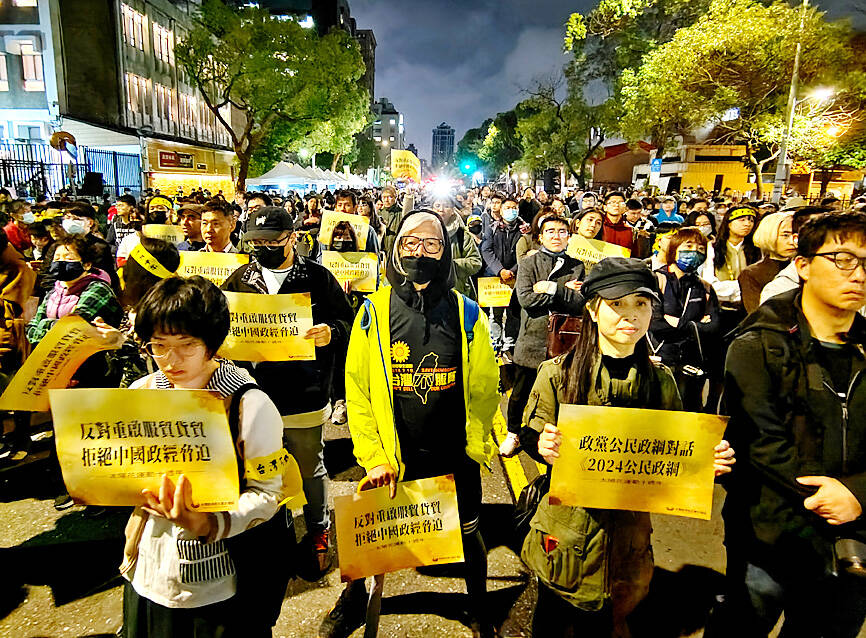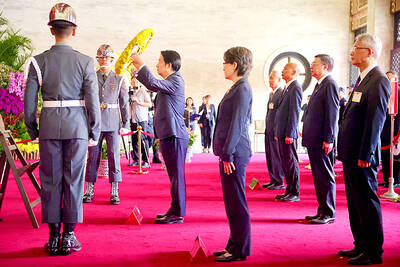Approval of a proposed cross-strait services trade agreement with China would have affected about 1.14 million service-sector enterprises, as well as the jobs and livelihoods of more than 5 million workers in Taiwan, rights advocates said yesterday as they marked the 10th anniversary of the Sunflower movement.
Taiwan Economic Democracy Union, in cooperation with other organizations, held a daylong series of lectures in Taipei to commemorate March 18, 2014, when students and rights campaigners occupied the legislative chamber to oppose the then-Chinese Nationalist Party (KMT) government’s plan to force the passage of the proposed service trade deal through the legislature.
It was the administration of then-president Ma Ying-jeou (馬英九) that agreed to the service trade pact, National Taiwan University professor of economics Jang Show-ling (鄭秀玲) said at one of the seminars.

Photo: Wang Yi-sung, Taipei Times
“The process was not transparent, the terms of agreement were unequal and unfair to us, and they risked undermining Taiwan’s national security,” she said. “Even then-legislative speaker Wang Jin-pyng (王金平) was not aware of it.”
“It was the Sunflower movement that blocked the trade pact from going ahead. Now in retrospect, we must be thankful as it safeguarded Taiwan,” she said.
“It would have impacted all service-oriented sectors and companies in Taiwan, affecting many people’s livelihood. It is an unequal trade pact,” she said. “The deal would have the Taiwanese government collaborate with Beijing in line with China’s 12th Five-Year Plan, which it adopted in 2011.”
Under Beijing’s plans, the service trade deal aimed to incorporate Taiwan into its new economic zone “for Chinese cities on the western shores of the Taiwan Strait” and upgrade the competitiveness of China’s service sector, as listed under its Five-Year Plan, she said.
“The trade pact would have opened up Taiwan’s airports, transportation hubs and shipping ports to Chinese businesses, which would have been a national security concern,” Jang said.
“If our legislature had approved it, it would have affected about 5.83 million employees in Taiwan’s service sector,” she said, urging the public to use their vote during elections to rebuke political parties that are planning to revive the service trade deal.
The Democratic Progressive Party released a statement commemorating the Sunflower movement, saying: “Ten years ago, the younger generation learned the importance of safeguarding democracy and freedom, of joining hands with fellow citizens to choose the nation’s path.”
“They understood the great dangers in offering Taiwan’s economic development and political system to China for its taking,” it said.
“The younger generation took action to deepen Taiwan’s democracy, consolidate our economic self-sufficiency and to make friends with all countries around the world, working together with countries that share our ideals about democracy and freedom,” it said.

RESPONSE: The transit sends a message that China’s alignment with other countries would not deter the West from defending freedom of navigation, an academic said Canadian frigate the Ville de Quebec and Australian guided-missile destroyer the Brisbane transited the Taiwan Strait yesterday morning, the first time the two nations have conducted a joint freedom of navigation operation. The Canadian and Australian militaries did not immediately respond to requests for comment. The Ministry of National Defense declined to confirm the passage, saying only that Taiwan’s armed forces had deployed surveillance and reconnaissance assets, along with warships and combat aircraft, to safeguard security across the Strait. The two vessels were observed transiting northward along the eastern side of the Taiwan Strait’s median line, with Japan being their most likely destination,

‘NOT ALONE’: A Taiwan Strait war would disrupt global trade routes, and could spark a worldwide crisis, so a powerful US presence is needed as a deterrence, a US senator said US Senator Deb Fischer on Thursday urged her colleagues in the US Congress to deepen Washington’s cooperation with Taiwan and other Indo-Pacific partners to contain the global security threat from China. Fischer and other lawmakers recently returned from an official trip to the Indo-Pacific region, where they toured US military bases in Hawaii and Guam, and visited leaders, including President William Lai (賴清德). The trip underscored the reality that the world is undergoing turmoil, and maintaining a free and open Indo-Pacific region is crucial to the security interests of the US and its partners, she said. Her visit to Taiwan demonstrated ways the

GLOBAL ISSUE: If China annexes Taiwan, ‘it will not stop its expansion there, as it only becomes stronger and has more force to expand further,’ the president said China’s military and diplomatic expansion is not a sole issue for Taiwan, but one that risks world peace, President William Lai (賴清德) said yesterday, adding that Taiwan would stand with the alliance of democratic countries to preserve peace through deterrence. Lai made the remark in an exclusive interview with the Chinese-language Liberty Times (sister paper of the Taipei Times). “China is strategically pushing forward to change the international order,” Lai said, adding that China established the Asia Infrastructure Investment Bank, launched the Belt and Road Initiative, and pushed for yuan internationalization, because it wants to replace the democratic rules-based international

WAR’S END ANNIVERSARY: ‘Taiwan does not believe in commemorating peace by holding guns,’ the president said on social media after attending a morning ceremony Countries should uphold peace, and promote freedom and democracy, President William Lai (賴清德) said yesterday as Taiwan marked 80 years since the end of World War II and the Second Sino-Japanese War. Lai, Vice President Hsiao Bi-khim (蕭美琴) and other top officials in the morning attended a ceremony at the National Revolutionary Martyrs’ Shrine in Taipei’s Zhongshan District (中山) to honor those who sacrificed their lives in major battles. “Taiwanese are peace-loving. Taiwan does not believe in commemorating peace by holding guns,” Lai wrote on Facebook afterward, apparently to highlight the contrast with the military parade in Beijing marking the same anniversary. “We